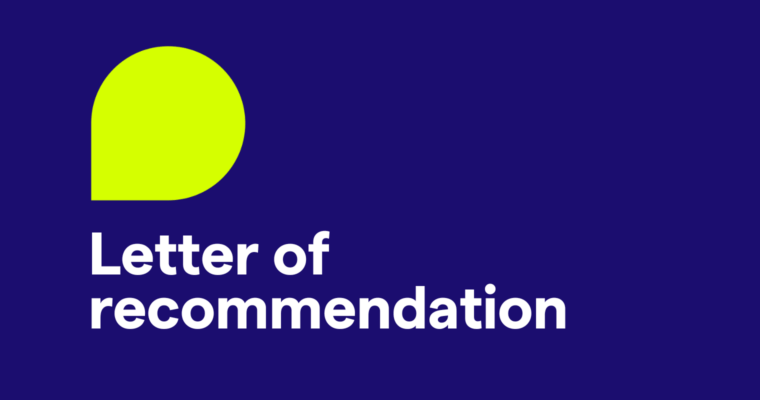
- A letter of recommendation is a written testimonial that recommends someone for a specific position or program.
- An effective letter of recommendation highlights an individual’s abilities and achievements to promote their suitability and qualification for a role.
- When writing a letter of recommendation, vouch for the candidate’s academic or professional performance based on your personal experience with them.
- Letters of recommendation use anecdotes and examples to demonstrate the attributes that make the candidate ideal for the position.
If somebody—a current or former student, colleague, intern, employee, or mentee—asks you to write them a letter of recommendation, take a moment to be proud of yourself. You’ve clearly made an impact on them, and they trust you enough to ask for help with moving forward in their career, education, or otherwise.
After you give yourself a pat on the back, write a letter of recommendation that will make them stand out as an exemplary candidate for the position they’re seeking.
Here are some tips on writing an effective letter of recommendation, including the types you may be asked to write, what to include, and what to avoid. We’ll also provide a letter of recommendation template that you can tailor to your candidate’s request.
Table of contents
What is a letter of recommendation?
What are the different types of letters of recommendation?
What to include in a letter of recommendation
Letter of recommendation template
6 tips for writing a letter of recommendation
What to avoid when writing a letter of recommendation
What is a letter of recommendation?
A letter of recommendation is an honest testimonial about an individual that recommends them for a specific role, grant, or acceptance into a program. Although the goal is to present the letter’s subject in the best light possible, you must convey the information factually.
It’s not enough to express that the candidate is a great person. The key to writing an effective letter of recommendation is to demonstrate why the candidate would be an asset to the company, school, or program to which they’re applying.
What are the different types of letters of recommendation?
An individual might ask you for a letter of recommendation for a few different reasons, which will dictate your approach and the topics you cover.
Academic letter of recommendation
Suppose a current or former student asks you to write a letter of recommendation. In that case, your letter should speak specifically about their academic performance and the traits that make them a strong candidate for the program or grant they seek. Here are some scenarios where a student might ask for a letter of recommendation:
- Undergraduate degree program
- A specific academic program within a university, such as the honors program or a particular major
- Graduate, medical, or law school
- A grant or scholarship
- An internship or fellowship
Whenever possible, tailor your letter of recommendation to the specific institution or program where the student is seeking acceptance.
Professional letter of recommendation
Professional letters of recommendation are another fairly common type. Many candidates ask former employers and mentors to help them with their job searches by recommending them for positions.
Here’s a critical difference between an academic and a professional letter of recommendation: In a professional letter of recommendation, the focus should be almost exclusively on the candidate’s professional performance and fitness for the specific role they’re seeking.
Home rental referral
Another type of letter of recommendation is for home rental referrals. Often, landlords ask prospective tenants for recommendations from previous landlords about their experience with the tenants.
If someone asks you to write a home rental referral, consider the new landlord’s potential concerns. Highlight the experiences that made your relationship with the tenant positive, like their promptness in paying the rent and the care they took of the property.
Regardless of the type of letter of recommendation, remember that the goal is to factually present the candidate as an ideal match for the position or program they seek.
What to include in a letter of recommendation
Your letter of recommendation shouldn’t be more than a page long. Keep it to approximately the same length as a cover letter: several focused paragraphs that concisely express your point. Some organizations may have specific letter of recommendation requirements, so ask the candidate about any guidelines you should observe.
In most cases, your letter of recommendation should include the following:
1 Date
Provide the date you send your letter, especially if there are specific application cycles or deadlines to adhere to. In some cases, late letters of recommendation will not be considered in academic applications and could disqualify the applicant from the admissions process.
2 Greeting
In the first line of your letter, greet the recipient directly. You don’t need to get creative here; a simple “Dear” followed by their honorific (Mr./Ms./Mrs./Mx./Dr.) and last name will suffice—you can clarify these with the candidate in advance. If you don’t know the recipient’s name, start your letter with “To whom it may concern.”
3 Introduction
In the following line, clearly state the name of the candidate and the position for which you recommend them. Introduce yourself and your relationship to the candidate in this section.
4 Overview
In this section, clearly state the attributes that make the candidate the ideal choice for the position they’re seeking. Depending on the type of recommendation you’re making, this could be a mix of personality traits and skills, or you could strictly focus on the candidate’s skills and accomplishments.
5 Personal anecdote
Elaborate on the traits you discussed in your overview with personal stories highlighting the candidate’s qualities and skills. Be as specific as possible—if there was a particular project where the candidate took the lead, or there are stats you can share about their work, include them here.
6 Closing statement
Bring your letter to a close with a statement reiterating your recommendation. This statement can include a personal testimonial.
7 Signature
Finish out your letter with a signature. Much like a professional email signature, your recommendation letter signature should include more than your name. Although you likely mentioned your relationship with the candidate in your letter, include your professional title beneath your name.
The letter’s recipient might want to contact you to discuss the candidate further, so make it easy for them to reach you by including your contact information in your signature. Usually, a phone number and email address will suffice, but you can provide further details like your hours of availability or LinkedIn profile.
Sincerely,
[Your first and last name]
[Your job title]
[Phone number or email address]
Best regards,
[Your first and last name]
[Your job title]
[Phone number or email address]
[LinkedIn profile]
Letter of recommendation template
Let’s combine the seven key components discussed above into a simple letter of recommendation template.
[Month and Day, Year]
Dear [Honorific and last name],
It is my pleasure to recommend [Candidate’s first and last name] for [Position] with [Company or organization name]. [Candidate’s first name] and I have worked together at [Company or organization name] for the past four years.
During our time together, [Candidate’s first name] proved to be [Adjective, adjective, and adjective]. [His/her/their] expertise in [Skill or subject] was a great asset that led to [Specific achievement or result].
It’s not just [Candidate’s first name]’s skills that impress me. [Candidate’s first name] was a joy to work with because of [His/her/their] [Trait] and [Trait]. [Example of when this trait was appreciated].
Without hesitation, I confidently recommend [Candidate’s first name] to join your team at [Company or organization name]. As a dedicated employee and [Adjective] person to work with, I know that [He/she/they] will be a valuable addition to your organization.
Sincerely,
[Your first and last name]
[Your job title]
[Phone number or email address]
6 tips for writing a letter of recommendation
1 Keep it relevant
Just like a cover letter, your letter of recommendation should be concise. It should highlight the key reasons the candidate is the ideal choice for the position they’re seeking, and any details you choose to include should support these reasons. Discussing the candidate’s character can be helpful, but you should tie it to their fitness for their desired role.
For example, if they’re applying for nursing school, discussing their commitment to ethics is a crucial detail to include. If the application is for a grant to conduct archeological research, mention the research projects they spearheaded while working with you.
2 Do your research
To make your letter of recommendation effective, learn what you can about the desired position so you can highlight any relevant skills or qualifications. Ask the candidate for a copy of the job description or program requirements. Get the most recent version of their résumé to help reference any particular achievements in your recommendation.
Time permitting, look at the company, organization, or academic program to better understand the type of candidate they’re looking for. Proper due diligence can help you focus your letter on the specific role and why the candidate is a good fit.
3 Include specific anecdotes, facts, and statistics
The more specific facts you have about the candidate’s work, the more compelling your letter of recommendation will be. For example, if you’re writing a letter for a colleague seeking a digital marketing position, mention specific conversion rates they achieved while working with you.
Similarly, if you’re recommending a high school student to a university, include anecdotes about their performance on specific assignments and extracurricular activities in your letter.
4 Use a positive, friendly, yet professional tone
The right tone for a letter of recommendation is professional yet approachable. Your relationship with the candidate and your regard for them should be evident in your writing’s tone.
Write your letter of recommendation in the same tone as a professional email. It shouldn’t overly assume familiarity with its recipient or read like a casual letter. Using an inappropriate tone for your recommendation letter can reflect poorly on the person you’re writing about, so be sure to get your tone right.
5 Polish your letter of recommendation to avoid errors
Even the most glowing letter of recommendation will make its subject look like a poor candidate if it’s riddled with spelling and grammar mistakes. Before you send your letter to its recipient (or their prospective new supervisor), take some time to proofread it and catch any mistakes you might have missed.
6 If you can’t write an effective letter of recommendation, don’t
You might find yourself in a situation where you can’t write an honest, effective letter of recommendation for somebody who asks for one. You might not know the person or their work well enough, or perhaps you found their work underwhelming or unsatisfactory.
In either case, the professional way to decline the request is to simply tell them that you aren’t familiar enough with their work to discuss it effectively or don’t believe you would be the best person to write them a letter of recommendation.
Depending on the situation, you could direct them to another person in your organization who’s more familiar with their work and is thus more capable of writing an effective letter of recommendation.
If this isn’t feasible, simply let them know you cannot write them a letter of recommendation and leave it at that. This isn’t the time to denigrate their work or tell them why you aren’t impressed with it.
What to avoid when writing a letter of recommendation
Forgetting to introduce yourself
In your letter, you’re personally vouching for the candidate. For your recommendation to have the intended impact, the person who reads your letter needs to know who you are and why you’re qualified to recommend the candidate. A quick introduction and a sentence about your relationship with the candidate are sufficient.
Generalizing
Take a look at these two example testimonials:
In the second example, the letter writer discusses specific courses Luis took and how he excelled in them. Many students usually apply for the same limited number of university spots, so your letter must communicate exactly what makes the candidate an ideal choice.
Hyperbole
Just as you shouldn’t send a generic write-up of the candidate’s achievements, you should also avoid embellishing them. Compare these two examples:
The first example, even if it’s true, reads more like a description of a comic book character than a testimonial of an actual person’s work. Using hyperbole in your letter of recommendation undermines its credibility, which can hurt the candidate’s likelihood of being accepted or hired.
Letter of recommendation FAQs
What is the purpose of a letter of recommendation?
A letter of recommendation is a written testimonial of an individual’s abilities, achievements, and capacity for continued growth with regard to a position they seek.
How should I start a letter of recommendation?
Start your letter of recommendation with a greeting that acknowledges the letter’s reader. Whenever possible, address them by name. When this isn’t possible, use a formal, professional greeting like “To whom it may concern.”
What should I include in a letter of recommendation?
A letter of recommendation should include the following:
- The date of your letter
- An introduction that states the candidate’s name and the position they are seeking
- A clear statement of your relationship with the candidate
- An overview of the attributes that make the candidate the ideal choice for the position they’re seeking
- An honest testimonial or personal anecdote that demonstrates the candidate’s abilities
- A closing statement that provides a confident recommendation of the candidate
- A signature that includes your contact information






